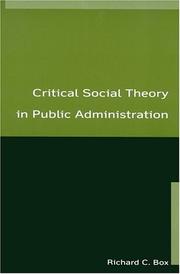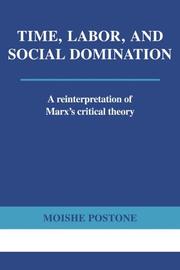| Listing 1 - 10 of 221 | << page >> |
Sort by
|

ISBN: 1461607108 129913601X 9781461607106 0742534499 9780742534490 0742534502 9780742534506 Year: 2005 Publisher: Lanham, Md. : Rowman & Littlefield,
Abstract | Keywords | Export | Availability | Bookmark
 Loading...
Loading...Choose an application
- Reference Manager
- EndNote
- RefWorks (Direct export to RefWorks)
Across a spectrum of academic disciplines, the topic of globalization is at the forefront of contemporary efforts to understand a dynamically changing world society. How might critical social theory respond creatively to the challenge of thinking and theorizing globalization in its full complexity?
Critical theory. --- Frankfurt school of sociology. --- Globalization.

ISBN: 1461610389 1299136117 9781461610380 9781299136113 0742512770 9780742512771 0742512789 9780742512788 Year: 2001 Publisher: Lanham, [Md.] : Rowman & Littlefield Publishers,
Abstract | Keywords | Export | Availability | Bookmark
 Loading...
Loading...Choose an application
- Reference Manager
- EndNote
- RefWorks (Direct export to RefWorks)
An edited collection of all new work in the area of 'new critical theory,' intended to serve as a signature volume for the New Critical Theory Series. The volume, like the series as a whole, is designed to capture the present moment in postdisciplinary theory, as the older tradition of critical theory in the Frankfurt School sense comes together with postmodernism and the new critical theory. It represents the dialogue that is taking place among the various strands of theory and can serve as a survey of contemporary leftist philosophy.
Book
ISBN: 9789004419032 9789004419049 Year: 2020 Publisher: Leiden;Boston BRILL
Abstract | Keywords | Export | Availability | Bookmark
 Loading...
Loading...Choose an application
- Reference Manager
- EndNote
- RefWorks (Direct export to RefWorks)
"In The Critique of Religion and Religion's Critique: On Dialectical Religiology, Dustin J. Byrd compiles numerous essays honouring the life and work of the Critical Theorist, Rudolf J. Siebert. His "dialectical religiology," rooted in the critical theory of the Frankfurt School, especially Theodor Adorno, Max Horkheimer, Walter Benjamin, Herbert Marcuse, Erich Fromm, Leo Löwenthal, and Jürgen Habermas, is both a theory and method of understanding religion's critique of modernity and modernity's critique of religion. Born out of the Enlightenment and its most important thinkers, i.e. Kant, Hegel, Marx, Nietzsche, and Freud, religion is understood to be dialectical in nature. It contains within it both revolutionary and emancipatory elements, but also reactionary and regressive elements, which perpetuate mankind's continual debasement, enslavement, and oppression. Thus, religion by nature is conflicted within itself and thus stands against itself. Dialectical Religiology attempts to rescue those elements of religion from the dustbin of history and reintroduce them into society via their determinate negation. As such, it attempts to resolve the social, political, theological, and philosophical antagonisms that plague the modern world, in hopes of producing a more peaceful, justice-filled, equal, and reconciled society. The contributors to this book recognize the tremendous contributions of Dr. Rudolf J. Siebert in the fields of philosophy, sociology, history, and theology, and have profited from his long career. This book attempts to honour that life and work. Contributors include: Edmund Arens, Gregory Baum, Francis Brassard, Dustin J. Byrd, Denis R. Janz, Gottfried Küenzlen, Mislav Kukoč, Michael, R. Ott, Rudolf J. Siebert, Hans K. Weitensteiner, and Brian C. Wilson"--
Frankfurt school of sociology. --- Religion --- Critical theory. --- Philosophy.

ISBN: 1317473566 076561555X 1317473574 1315705346 9781317473572 0765615541 9780765615541 Year: 2015 Publisher: London ; New York : Routledge,
Abstract | Keywords | Export | Availability | Bookmark
 Loading...
Loading...Choose an application
- Reference Manager
- EndNote
- RefWorks (Direct export to RefWorks)
The essential premise of critical social theory is that contemporary society is neither democratic nor free, but that modern global capitalism creates a citizenry satiated with consumer goods, unaware of alternative ways of living. In the public sector, critical theory suggests that governing systems are influenced, if not controlled, by the wealthy and powerful, leaving public professionals to decide whether to serve those interests or the interests of a broader public. This book provides a framework for the application of critical social theory in public administration. Its goal is to encour
Public administration --- Critical theory. --- Frankfurt school of sociology. --- Philosophy.
Book
ISBN: 128311979X 9786613119797 9004194681 9789004194687 9789004188006 9004188002 Year: 2011 Publisher: Leiden [The Netherlands] ; Boston : Brill,
Abstract | Keywords | Export | Availability | Bookmark
 Loading...
Loading...Choose an application
- Reference Manager
- EndNote
- RefWorks (Direct export to RefWorks)
This book provides a thematic account of the changing political philosophy of critical theorists from Adorno to Habermas and Honneth. In addition to teasing out unexplored elements of political thought from the writings of important Frankfurt School intellectuals and their successors, the book seeks to establish the relevance of this tradition for contemporary political theory. Readers are offered an inside perspective, developed out of primary texts including some hitherto unused sources, which is combined with the outside perspective of non-Frankfurt School traditions such as cultural sociology. Heins presents a fresh reading of Critical Theory in ways that remind us both of what this theory is and what it can be.
Critical theory --- Frankfurt school of sociology. --- Sociology --- Political aspects.
Book
ISBN: 9789004526044 9789004526051 9004526056 Year: 2022 Publisher: : BRILL,
Abstract | Keywords | Export | Availability | Bookmark
 Loading...
Loading...Choose an application
- Reference Manager
- EndNote
- RefWorks (Direct export to RefWorks)
"Subject of numerous interpretations and studies, the vicissitudes of the famous Frankfurt Institute for Social Research nevertheless still reserve some little-known pages, such as the human and scientific relationship that bound philosopher Max Horkheimer and economist Friedrich Pollock for over fifty years. Based on texts and letters translated here into English for the first time as well as some previously unpublished documents, the book reconstructs the crucial moments in the friendship between the two scholars with a narrative style and philological accuracy. Nicola Emery accompanies us through the two friends and intellectuals' "nonconformism" and search for an alternative life-form that led to the birth of the Frankfurt critical theory"--
Frankfurt school of sociology. --- Conformity. --- Horkheimer, Max, --- Pollock, Friedrich,
Book
ISBN: 0521228425 0521296757 Year: 1980 Publisher: Cambridge : Cambridge university press,
Abstract | Keywords | Export | Availability | Bookmark
 Loading...
Loading...Choose an application
- Reference Manager
- EndNote
- RefWorks (Direct export to RefWorks)

ISBN: 0521565405 9780521565400 9780511570926 9780521391573 0511570929 0521391571 Year: 1993 Publisher: Cambridge Cambridge University Press
Abstract | Keywords | Export | Availability | Bookmark
 Loading...
Loading...Choose an application
- Reference Manager
- EndNote
- RefWorks (Direct export to RefWorks)
Moishe Postone undertakes a fundamental reinterpretation of Karl Marx's mature critical theory. He calls into question many of the presuppositions of traditional Marxist analyses and offers new interpretations of Marx's central arguments. He does so by developing concepts aimed at grasping the essential character and historical development of modern society, and also at overcoming the familiar dichotomies of structure and action, meaning and material life. These concepts lead him to an original analysis of the nature and problems of capitalism and provide the basis for a critique of 'actually existing socialism'. According to this new interpretation, Marx identifies the core of the capitalist system with an impersonal form of social domination generated by labor and the industrial production process are characterized as expressions of domination generated by labor itself and not simply with market mechanisms and private property. Proletarian labor and the industrial production process are characterized as expressions of domination rather than as means of human emancipation. This reinterpretation entails the form of economic growth and the structure of social labor in modern society to the alienation and domination at the heart of capitalism. This reformulation, Postone argues, provides the foundation for a critical social theory that is more adequate to late twentieth-century capitalism.
Critical theory. --- Frankfurt school of sociology. --- Marxian economics. --- Social Sciences --- Sociology --- Critical theory --- Frankfurt school of sociology --- Marxian economics --- Théorie critique --- Ecole de Francfort (Sociologie) --- Economie marxiste
Book
ISBN: 014080966X Year: 1976 Publisher: Harmondsworth Penguin
Abstract | Keywords | Export | Availability | Bookmark
 Loading...
Loading...Choose an application
- Reference Manager
- EndNote
- RefWorks (Direct export to RefWorks)
Sociological theories --- Critical theory. --- Frankfurt school of sociology --- Sociology --- Sociology. --- History.
Book
ISBN: 0745604307 0745604218 Year: 1987 Publisher: Cambridge Polity
Abstract | Keywords | Export | Availability | Bookmark
 Loading...
Loading...Choose an application
- Reference Manager
- EndNote
- RefWorks (Direct export to RefWorks)
Social sciences --- Critical theory. --- Liberty. --- Frankfurt school of sociology. --- Philosophy. --- Social sciences (general)
| Listing 1 - 10 of 221 | << page >> |
Sort by
|

 Search
Search Feedback
Feedback About UniCat
About UniCat  Help
Help News
News